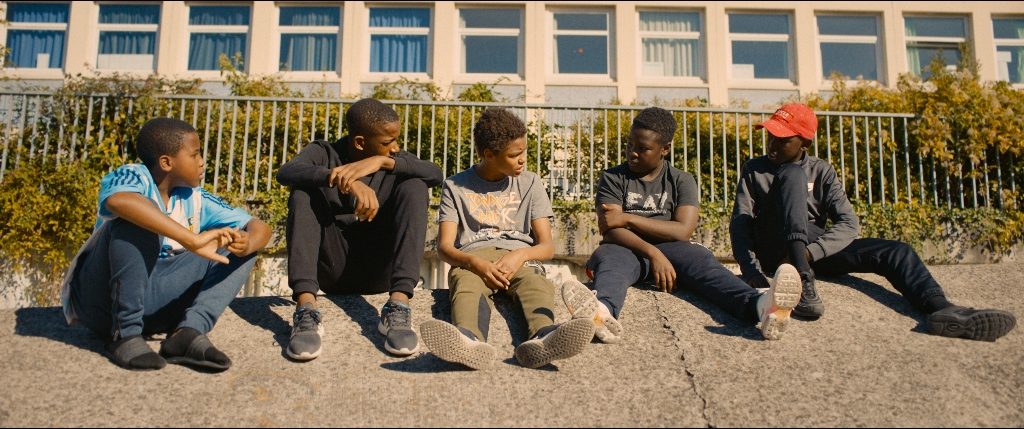
Ladj Ly’s debut feature, Les Misérables, opens with a young boy wearing the French flag draped on his shoulders, a declaration of identification and belonging: I am France. The boy’s name is Issa (Issa Perica) and as he goes out to meet his friends and join the crowds celebrating France’s 2018 World Cup championship, there is no accompanying music, just the sound of his footsteps, street sounds and the kid’s conversations, giving those initial moments the feel of a documentary. Once the youths join the mass of enthusiastic celebrants in the center of Paris, waving flags and singing La Marseillaise, instrumental music enters, and within it, an ominous undertone. As one looks at the enormous mass of people, all singing out love and victory, one cannot help wonder: what if all this energy turned to anger and hate?
The fast-paced, suspenseful, drama is a feat of visual storytelling, as so much is conveyed by the precise and evocative cinematography (Julien Poupard). Set in Les Bosquets, a poor housing project in the suburbs of Paris (where director and co-screenwriter Ladj Ly grew up) the shifting perspectives of the narrative and camera follow the children, different factions and gangs in the neighborhood, and the three members of the anti-crime police assigned to keep the peace.
Stéphane Ruiz (Damien Bonnard) is a new member of the anti-crime squad, and as his partners Chris (Alexis Manenti) and Gwada (Djebril Zonga), introduce Stéphane to the neighborhood and their questionable methods, the viewer becomes part of his initiation. First stop is the police station, where an aggressive verging on abusive atmosphere prevails, and La Commissaire (Jeanne Balibar) flaunts her rank by flirting with her subordinates, then doesn’t even blink when informing Stéphane that she “does not approve of inappropriate behavior”. Meanwhile, on the sidelines of the station, an irate father is yelling and throwing things at his son, who has just been picked up for stealing. The son is Issa. This is a film in which every moment counts, each frame full of information, from intense close-ups, to the literally bird’s eye view from the drone operated by Buzz, a quiet kid who likes to observe.
Les Misérables immerses the viewer in the life of the neighborhood. Its denizens – the kids and teens living in poverty, the self-designated “Mayor” (Steve Tientcheu) and his protection plans, the Muslim Brotherhood recruiting kids with offers of candy, rival gangs, Chris the corrupt and cynical cop, and even a circus troupe – create a complex portrait of mounting anger and intensifying tensions with no resolution in sight.

In a very different mode, Queen of Hearts, directed by May El-Toukhy, very deliberately depicts an extreme situation with impeccable elegance, precision and distance. Anne, portrayed with chilling force by Trine Dyrholm, is a lawyer who specializes in representing young people who are victims of violence and abuse. She and her doctor husband Peter are the parents of adorable twin daughters, and their family life, complete with riding lessons and bedtime stories for the girls, is picture perfect, as is their lovely home. Intelligent, confident, and tough, Anne stands by her clients all the way, perhaps on occasion going a bit too far, literally not only bringing her work – a client – home with her, but letting her take a shower. Boundaries seem to be an issue for Anne.
The arrival of Gustav (Magnus Krepper) , Peter’s teenage son from a previous marriage, disrupts the family’s placid existence. Expelled from yet another school, Gustav’s mother Rebecca has effectively given up on him. The girls, Fanny and Frida, are excited to have a big brother come live with them, but tense and troubled, Gustav does not show any inclination to return their affection or even get to know them. Peter, who has not been involved in his son’s life up until now, does not seem to be able to connect with him now. In this family, they do read Alice in Wonderland, but they don’t really talk about feelings. One might think that with her experience working with young people, Anne might have insight or empathy into Gustav’s situation. At first, it seems that events are going in that direction, but it soon becomes apparent that Anne’s intentions are anything but pure.
Anne’s pursuit of Gustav and her utter lack of self-awareness is shocking, and as the narrative arc continues, the feeling of shock only intensifies. Anne remains remarkably opaque to the viewer, who can only follow her actions and their consequences. Although there are some slight hints that her backstory may provide some explanation of her current actions and emotional state, her inner world is consistently denied to the viewer. Queen of Hearts is a beautifully rendered and deeply disturbing film that raises a multitude of questions.
The 36th Jerusalem Film Festival will take place from July 25 – August 4, 2019. Films participating in the International Competition include: High Life, directed by Claire Denis; Fire Will Come, directed by Oliver Laxe; The Ground Beneath My Feet, directed by Marie Kreutzer; The Invisible Life of Eurídice Gusmão, directed by Karim Aïnouz; Light of My Life, directed by Casey Affleck; One Child Nation, directed by Nanfu Wang and Jialing Zhang; Pain and Glory, directed by Pedro Almodóvar; Portrait of a Lady on Fire, directed by Céline Sciamma; The Whistlers, directed by Corneliu Porumboiu; The Wild Goose Lake, directed by Diao Yinan. Information on films, screenings and other festival events may be found on the Jerusalem Film Festival website.
Les Misérables, directed by Ladj Ly
France/2019/104 minutes/French with Hebrew and English subtitles
Queen of Hearts, directed by May el-Toukhy
Denmark, Sweden/2019/127 minutes/Danish and Swedish with Hebrew and English subtitles





